The tall tale of Toilet Karen, the self appointed Trans-Catcher General of Edinburgh
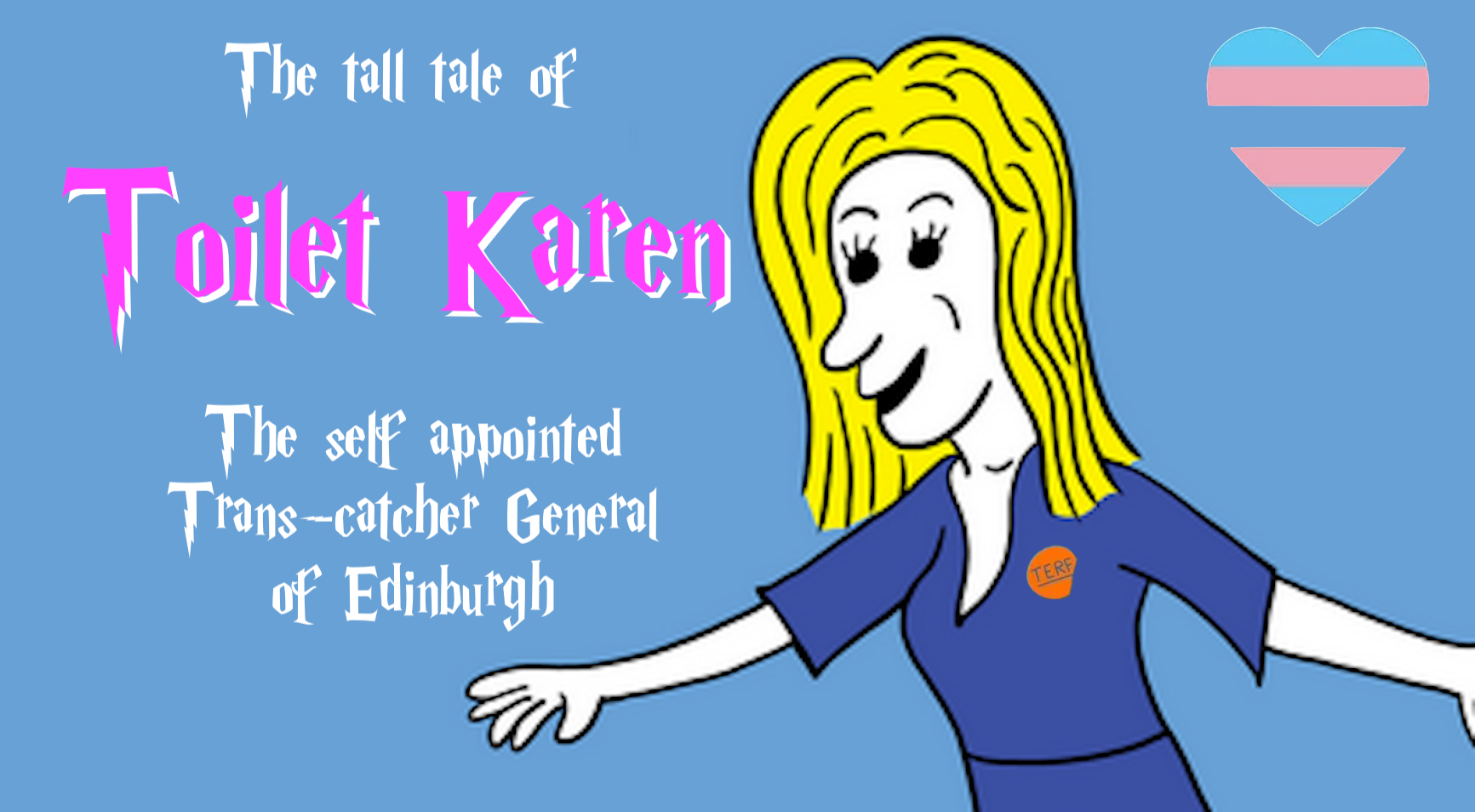
In the ancient, fog-wreathed city of Edinburgh, where ghosts politely haunt and tourists pay exorbitantly to pretend they believe in them, a new figure stalks the cobbled streets. Now joining them was a self appointed guardian of the porcelain. Cold, angry, flush with unjustified malice and on an evangelistic pseudomedical terfish mission. Once, long ago and in a different life, she had inspired children, through magic, on the virtues of solidarity, family, and inclusion.
But somewhere along the way, perhaps after an unfortunate encounter where she was twatted with a rogue Quidditch ball to the head,* her brain took a peculiar turn. The resulting damage didn’t dull her resolve so much as sharpen her into a right old weapons grade arsehole: bitter, stubborn, and armed with a clipboard instead of a wand.
Her cape was less silk and more polyester blend, frayed at the edges as if it had weathered one too many storms of outrage. The once-bright embroidery of hopeful slogans had faded to tired sighs. Her eyes darted nervously beneath thick glasses, haunted not by ghosts, but by a past self: the one that cared - the one who believed in magic beyond the wand, in courage beyond the curse, and in friendship that transcended bloodlines. The one that made her rich.
That self had vanished beneath fragile tepid faecal layered grievances and brittle certainty. Her clipboard, cracked and stained with countless coffee rings, was no longer just a tool: it was a talisman against a world she felt slipping through her fingers. Every pointed tweet was a stab at reclaiming a narrative already unravelling like a badly knitted scarf. By her side marched an ever-proud, ever-sniffy companion: Ann Widdecombe, always one for a reactionary cause, whose nose seemed permanently tilted skyward as though perpetually inhaling the scent of her own self-importance. Her voice was a relentless lecture, like Jean Brodie, if Jean Brodie used Mons Meg to fire at dinghies with immigrants in them, punctuated by tutting that could curdle fresh milk, and a wardrobe of tweed that seemed stitched from the fabric of unyielding judgment. Ann’s spectacles gleamed with the cold fire of righteousness. “Honestly, one wonders how people manage to survive without a proper dose of common sense and good old-fashioned decency,” she sniffed, as if the very air around her had been sullied by modernity. And this was Cowgate… in the Old Town, in Edinburgh, which to be fair was marginally more modern than her attitude.
Together, in unashamed demonstrations of anatomical fascism, they prowled the misty closes and echoing halls of Edinburgh’s museums and cafes, hunting those who dared to challenge the sacred order of ‘biological essentialism.’ Their crusade was less a noble quest than a desperate grasp at a world that had moved on without them. Toilet Karen’s voice sometimes wavered, betraying the storm beneath. “I once believed in magic,” she murmured, clutching the familiar, dusty tome she’d once adored: a story of bravery, friendship, and acceptance. “But now… now it feels like a cruel joke.” It was if what passed for a conscience was playing tricks on her. Ann, stiff as a statue carved from moral granite, snapped, “Magic? Bah! What’s needed is order! Discipline! And a strict adherence to what’s right. Not this nonsense about feelings and identity.”

As daytime turned to evening, the duo faced their greatest stage: a broadcast on GB News, the kingdom’s swivel eyed temple of righteous fury and spectacle. The Trans-Finder General's hands trembled slightly as she clutched her cracked clipboard. Her polyester cloak hung limply, shadows pooling beneath her eyes. Behind her, the screen flickered to life with CCTV-style footage: grainy images of anonymous toilet users, rendered with the grim gravity of a Crimewatch special. 'Toilet watchers' she intoned, voice cracking, “here is… someone who dares to… well, just be.” She gestured shakily at a blurred figure. “Look at their gait! confident. Unapologetic. Defying the rules.” She was visibly seething and unquestionably unhinged.
Ann sniffed loudly, adjusting her glasses with a patronising tilt. “Quite right. Where’s the respect for tradition? Next, they’ll be demanding to fly broomsticks to work.”
Suddenly, the clipboard emitted a high-pitched whistle and sparkled uncontrollably. The screen blurred, shifting to an enormous rubber duck drifting down the Royal Mile. Ann gasped, clutching her handbag like it contained the last shreds of civilisation. “Is this some sort of… mockery?” Toilet Karen’s cheeks flamed crimson. “No… technical difficulties,” she stammered. “Nothing to see here. Carry on!” The past. Her past. It did this…sometimes.
Footnotes
- The Damaged Cloak — Polyester may last forever, but so does regret. The cloak is a map of battles lost to time and tweets.
- The Clipboard of Fragile Authority — Once a symbol of control, now a battered shield against the chaos of change.
- Ann’s Tweed of Judgement — Woven from the finest strands of condescension and piety, impervious to reason or empathy.
- The Lost Magic of Empathy — A spell too subtle for brittle hearts that wield anger as a weapon.
- The Quidditch Concussion — Legend has it that the blow was delivered by a rogue bludger during a particularly fierce match near the Astronomy Tower. No one has been quite the same since.
Edinburgh sighed through its fog, bemused and weary. The Trans Catcher General and her officious sidekick retreated, one haunted and trembling, the other sniffing and tutting. The city knew the real magic lay elsewhere, in kindness, laughter, and the quiet courage of those who dared to live authentically.
And somewhere, just out of sight, the rubber duck floated helplessly towards Leith.
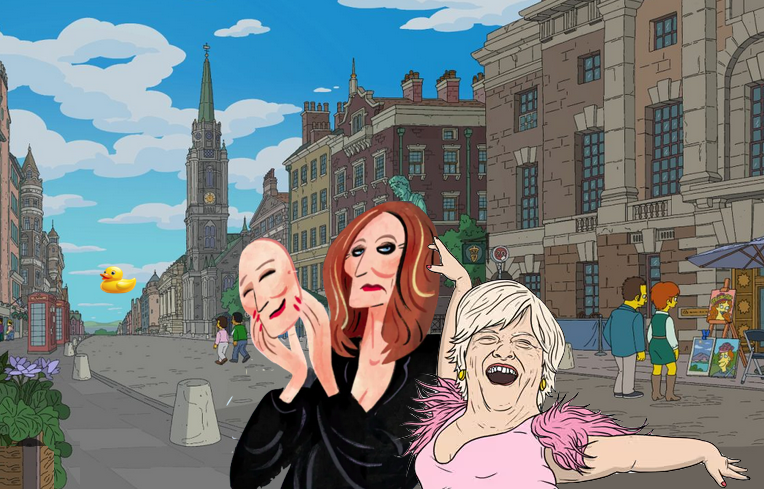
Early the following morning, Toilet Karen found herself outside the Greyfriars Kirkyard, pacing nervously by the statue of Greyfriars Bobby, the eternally vigilant Skye Terrier, forever guarding his master’s grave. She was up early, I mean how on Earth can you manage a crusade of bigotry if you sleep in for pities sake? She frowned up at the scruffy little dog with his loyal, wise eyes and tilted her head. “You see, Bobby,” she began, voice slightly sharp with frustration, “There are rules. Biological facts. You’re a dog. You have no choice in that. You don’t get to choose your gender, or change it, or whatever these modern types are saying.”
Bobby, for his part, didn't wag his tail patiently and said nothing, which was probably for the best. Had he, he might have explained that loyalty and love, not rules or biology were what made him legendary.
But she was on a roll. “Look at me,” she continued, voice cracking like an old broomstick. “I once believed in magic. I believed in friendship and family and courage. But now it’s all muddled. People want to rewrite everything. even what it means to be a man or a woman.”
At this, a sudden gust of cold wind ruffled the dog’s fur, as if he sighed in the breeze. To onlookers, the statue seemed to glow with quiet dignity, the sort of dignity that didn’t care for outdated arguments.
Ann Widdecombe shuffled up, folding her arms with a sniff. “Honestly, talking to a dog is hardly the way to convince people of your moral certainties.”
They glared at each other, her eyes flickering with a fleeting, fragile spark of the person she used to be. “Maybe the dog understands better than some,” she muttered. The sun was climbing over the old stone walls as the fog crept closer, swallowing the square. Looking down at Bobby’s stone base she whispered, “Maybe some magic never dies after all.”
Bobby, after a moment’s thoughtful pause, emitted a sudden sharp bark that echoed off the stone walls: "Fuck off, ye miserable terf bawbag, ye've nae right tae spew yer bile aroond like the wee petulant gobshite ye are!"
She stepped backwards and blinked. Her mouth opened, then closed again. Ann Widdecombe, nearby, tutted so hard it sounded like an avalanche. “Honestly! Such language in sacred grounds.”
But Bobby wasn’t done. Another bark, sharper this time, almost like a growl, resonated: “Aw for fucks sake, lavvy heid Reality check. Get one. Yer bums oot the windae”
The wind swept through the graveyard as Toilet Karen’s eyes darted, haunted. For a fleeting moment, she seemed less the Trans-Catcher General and more a woman wrestling with a truth far bigger than her fragile certainty. Ann sniffed loudly, flicked her tweed jacket, and muttered, “Dogs. They do have a way of telling you what you don’t want to hear.” She turned away, clutching her clipboard like a shield, as Bobby sat proudly loyal, wise, and infinitely less fragile than either of them.
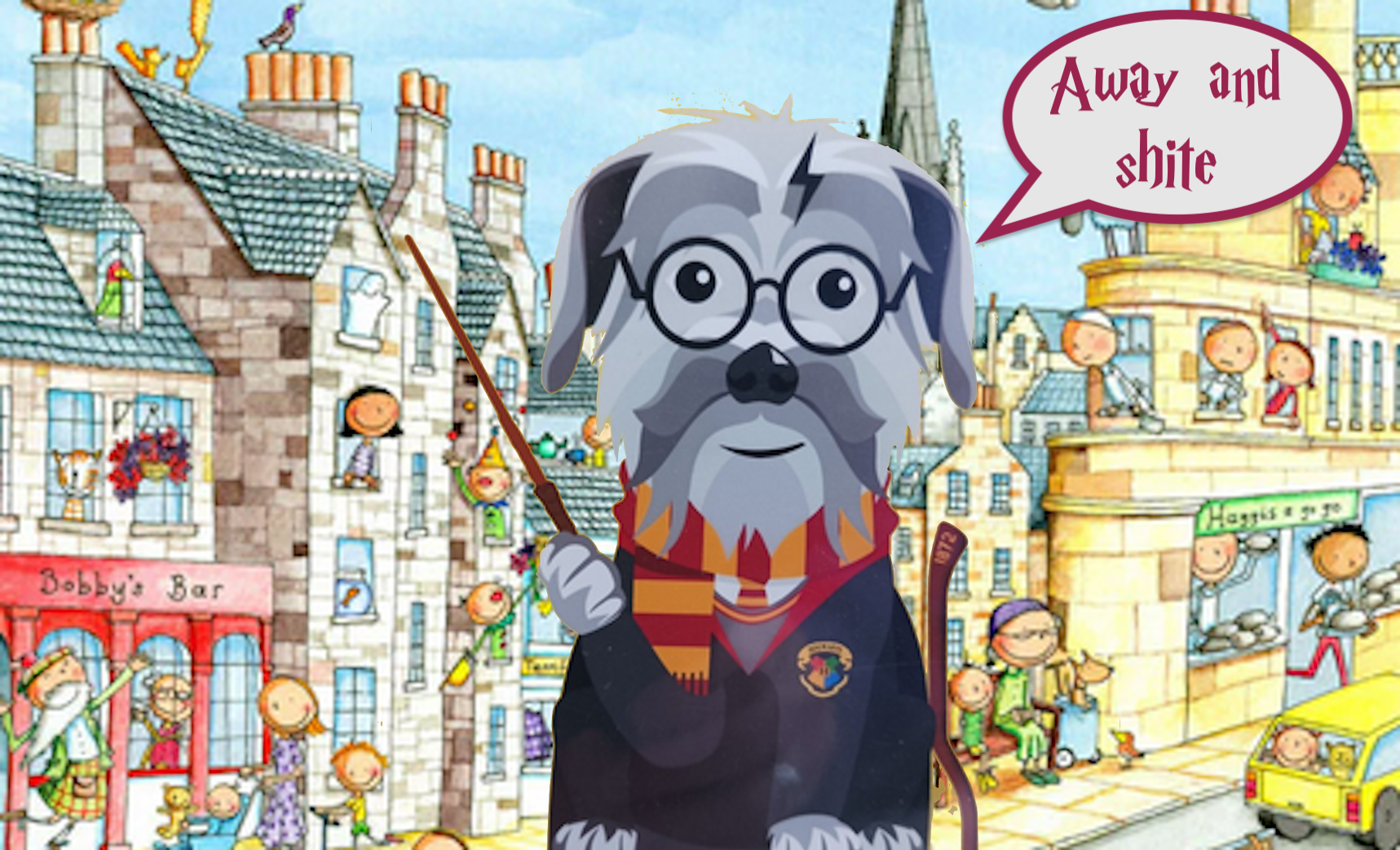
She wasn’t always this wretched. Once, she was a fresh-faced scribbler of children’s dreams, pen poised above coffee-stained notebooks in cosy Edinburgh cafes, weaving stories that danced with hope, magic, and the warmth of belonging. Her words had the sparkle of new dawns and the gentle pull of friendship’s promise. But somewhere along the winding path, irrational hatred and an unshakable allegiance to battles that never truly existed began to poison her mind like a cursed potion brewed too long. She clung fiercely to phantoms of 'things that never happened' weaving elaborate conspiracies from smoke and mirrors, all while her own reflection grew stranger and less recognisable.
Like a tragic portrait locked away in some hidden attic, her real self: twisted into a grotesque Dorian Gray of the soul, her public face tried desperately to keep the illusion alive. But the mask cracked in the silence, revealing a face drawn tight with bitterness, eyes flickering with restless suspicion, and a soul rotting from the inside out. Her face, once animated by bright-eyed wonder, had shrivelled into a map of distain, sharp lines carved by sleepless nights and whispered resentments. Her eyes, once windows to worlds of possibility, now flickered with a restless suspicion, darting around as if expecting betrayal in every shadow. Inside, the rot was worse. The warmth had curdled into venom, the empathy faded into a brittle shell of anger. Where there had been stories of unity, there was now only rancour: a gnawing hunger to tear down rather than build up.
So the once revered children’s author now turned shite superhero and porcelain peeper was in every sense, a tragic paradox: a woman who had once spun dreams and fostered hope, now trapped inside a twisted, haggard shadow of herself, damaged on the outside and uglier still within. Once, she wanted to beat the system. Shake it up with stories of hope and magic, rewrite the rules in favour of solidarity and kindness. Now, she was the CIS-tem: rigid, unyielding, and utterly convinced that the old scripts must never be rewritten, no matter how much the world changed around her. No matter how much they were, well, wrong.
She had become a pastiche: almost a metaphor for the excitable young children who concussed themselves running head first into one of the brick columns between platform nine and ten at Kings Cross station. Only she was doing this to herself. Doing it everyday, for the rest of her life but in the form of toxic tweets. Toilet Karen had become a living contradiction: a storyteller trapped in a decaying portrait of genital fixation, not only in visage but in the corrosive darkness she’d allowed to seep into her heart.
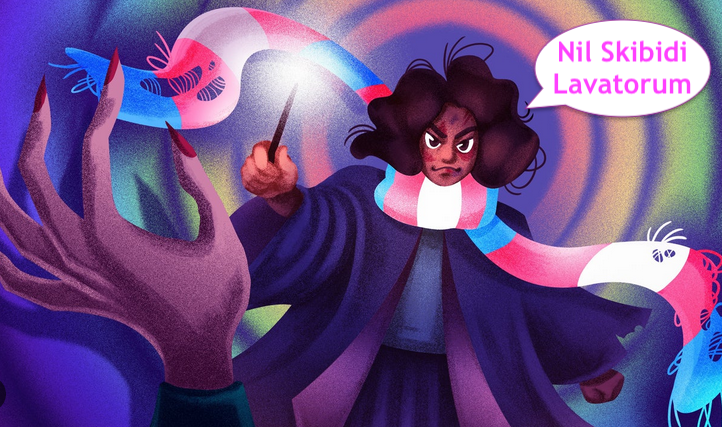
Meanwhile in Hogwarts:
Hermione:“It’s not about who we were, Harry, but who we choose to become, even when the world tries to define us otherwise.”
Harry:“Then let’s be brave enough to write our own story, every day.”
Now, Toilet Karen (as you may have guessed by now not her real name, but these things have a way of sticking like dried porridge to the bottom of a pan) had opinions. Opinions the size of buildings, built on foundations of what she called ‘common sense’ - and everyone else with an ounce of humanity called ‘utter bollocks’.
And when it came to the trans community, she had firmly planted her flag, pitched her tent, and built a small but fiercely deluded fortress on the banks of Ignorance Creek. No amount of gently wafted facts or carefully folded empathy would move her or her pecker-policing puritanism. She stood there, immovable, like the last poo in the bowl after three flushes. You know the one. Magic, in her twisted world, had rules. Gatekeeping was a civic duty. And empathy? Empathy was for the weak. Or at least, for people who hadn’t made millions selling stories about children learning to be brave by doing things like not being anything like her.
If Harry and Hermione ever got wind of it, they’d be aghast. Probably set Dobby on her. Because bravery, real bravery, doesn’t look like an embittered harpie shouting from a mansion. It looks like standing up for someone when the rest of the world’s trying to shove them back in the cupboard under the stairs.
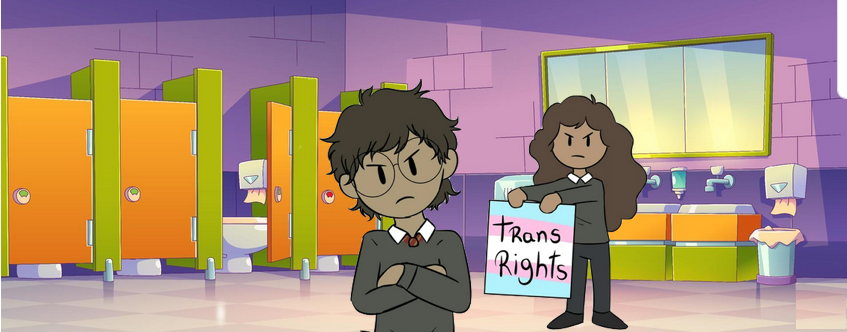
So her unhealthy fixation on all things LGBTQ+ and Armitage Shanks was less about concern and more about a kind of fevered mania, like someone who’s convinced the neighbour’s cat is a Russian spy. Every week brought a new unfounded sexual paranoia. Less Philosopher’s Stone, more Fill-Orifice Bone. Less Chamber of Secrets, more Chamber of Semen. Less Goblet of Fire and more Gobbling a fella and certainly less Order of the Phoenix, and more “Quick! Check if they have a penis!”
It would be funny, if it weren’t so...well, so bloody sad. Thanks to people like her real People are getting hurt, and she’s still stuck there, poster girl for the very worst of humanity, like a female Laurence Fox who's swapped a Hogwarts wand for a cigar, flapping her arms like a goose with love eggs up its arse that’s just discovered feminism in a tabloid.
The trans community: beautiful, fragile, oppressed and vulnerable but ... determined, bless their defiant little boots, carry on. They always do. They don’t curse her back, not really. Not because they couldn’t - a well-aimed hex is just good manners in some parts of Edinburgh, but because they’ve got better things to do. Like live. Like love. Like quietly pity the poor wretched gender-critical genital ghoulish soul snarling from her tower of tweets.
Because in the end, true courage isn’t shouting loudest, or hiding behind a multi- million-pound publishing deal. It’s letting people in. Especially those the world keeps slamming doors on. It’s kindness when no one’s looking. It’s standing up even when your legs shake. It’s being the wizard who opens the gates, not the one who slaps a ‘No Entry Unless You Conform’ sign on the drawbridge.
And people like her? Well, they’ll never understand that. They’re dinosaurs roaring at the meteor, mistaking it for a shooting star. But here’s the magic trick: the real magic: when they finally shuffle off this mortal coil, after wasting a goodly chunk of their life enveloped in anger and bitterness, probably muttering something about biology and bathrooms, their hatred will vanish with them. And the world? The world will be just a little brighter. Because bigotry dies. Hate dies. Anger about something that has got absolutely no fucking impact in your life dies.
And public toilets? Well, they’ve always had and always will have lockable cubicles. Even the ones in the contorted mind of someone who has convinced themselves that a none-issue about people she has never met and doesn't understand is a cause to fund, a flag to fight behind and a hill to die on.
But love? Love sticks around. Because love is the purest form of humanity. Hate is temporary but love is immortal.
And love hugs you, whoever you are, takes you for a coffee, finds a safe place for you, comforts you and doesn't judge or discriminate. Love's like that - it's what it does... and it shines.
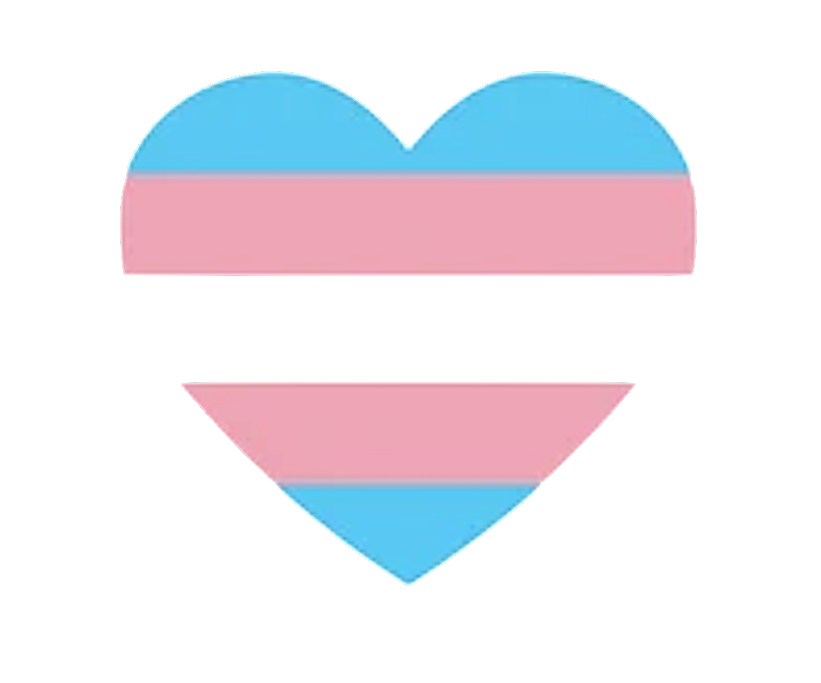
A bit of shameless self-plugging here. This is www.TetleysTLDR.com blog. It's not monitised. Please feel feel to go and look at the previous ones on the website and if you like them, please feel free to share them.

